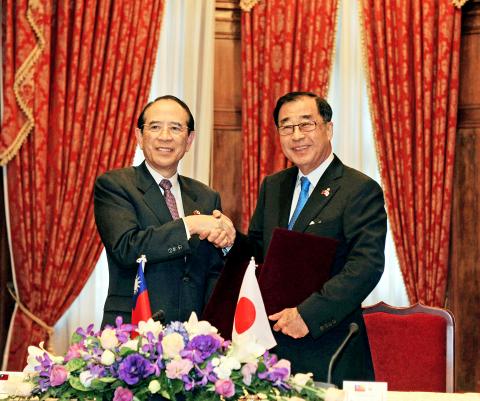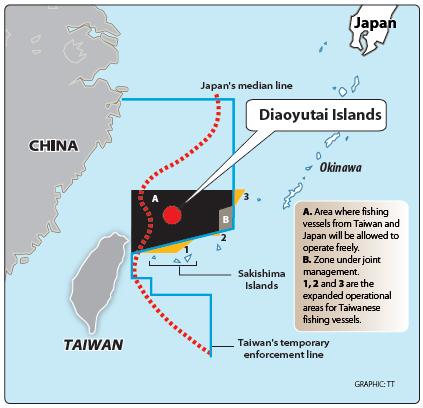Taiwan and Japan yesterday inked a fisheries agreement in a bid to end controversies over fishing in waters surrounding the contested Diaoyutai Islands (釣魚台). The agreement includes an escape clause which Taipei said allows both sides to set aside disputes over their competing sovereignty claims.
The agreement assured Taiwanese vessels an intervention-free fishing zone in waters between 27° north latitude and the Sakishima Islands, Okinawa Prefecture, and gave Taiwan an additional fishing zone of 1,400 square nautical miles (4,800km2) outside Taiwan’s temporary enforcement line, government officials said.
Under the deal, fishing vessels from both countries can operate in a large area within the designated zone without being subject to the jurisdiction of the other side, while a smaller area of the zone, where Japanese fishing vessels frequently operate, is under joint management by the two governments.

Photo: CNA
Provisions under the agreement do not apply to waters within 12 nautical miles — a state’s territorial waters — surrounding the Diaoyutai Islands, because the islands are claimed by both Taiwan and Japan, which calls them the Senkaku Islands.
China also claims sovereignty over the Diaoyutais. Japan and China signed a fisheries agreement in 1997, which took effect in 2000, under which both sides co-manage waters above 27° north latitude.
At the signing ceremony at the Taipei Guest House, Association of East Asian Relations Chairman Liao Liou-yi (廖了以) and Interchange Association, Japan Chairman Mitsuo Ohashi hailed the agreement, which they said marked a big step forward in bilateral relations.

The negotiations yesterday were the 17th round since talks started in August 1996.
Taipei and Tokyo initiated fishery talks following incidents of Taiwanese fishing boats being seized, detained or expelled by the Japan Coast Guard after Tokyo ratified the UN Law of the Sea Treaty in 1996 and set up a 200 nautical mile exclusive economic zone that included waters surrounding the Diaoyutais.
Ohashi said it was “with great pleasure” that the deal was finally signed.
The primary goals were to “maintain peace and stability in East China Sea” and to “strengthen the existing friendly relations with Taiwan,” he said.
At a press conference after the signing ceremony, Minister of Foreign Affairs David Lin (林永樂) said that the agreement did not address the competing claims over the Diaoyutais, as both governments agreed to “set aside the dispute.”
As stated in Article 4, provisions that both sides have agreed to under the deal have no effect on each side’s sovereignty claims over the Diaoyutais, Lin said, adding that the escape clause was written into the agreement at Taipei’s insistence.
"We did not back down one bit over the sovereignty issue in the talks,” Lin said.
Waters within 12 nautical miles surrounding the Diaoyutais were exempted from the agreement because “we insisted that the area is our territorial sea, while Japan upheld its position” that it is theirs, Lin said.
Coast Guard Administration Minister Wang Jinn-wang (王進旺) called on Japanese and Chinese fishing vessels not to operate in waters within the 12 nautical miles surrounding the Diaoyutais and vowed to adopt appropriate measures against Chinese and Japanese fishing vessels to protect the rights of Taiwanese fishermen.
Under the agreement, Taiwan and Japan also agreed to establish a fisheries commission to discuss other issues, including the delineation of overlapping waters in their respective exclusive economic zones above 27º north latitude and waters south of Sakishima Islands, on an annual basis.
Meanwhile, China yesterday expressed concern about the new agreement.
“We are extremely concerned about Japan and Taiwan discussing and signing a fishing agreement,” Chinese Ministry of Foreign Affairs spokesman Hong Lei (洪磊) told a daily news briefing.
“We hope that Japan earnestly abide by its promises on the Taiwan issue and act cautiously and appropriately,” she said.
Additional reporting by Reuters
History of negotiations
‧ First two rounds of negotiations, 1996: Both sides insisted on their respective sovereign claims over the Diaoyutai Islands and did not have substantial discussions about fisheries issues.
‧ Third round of negotiations, 1997: Working-level discussions began about fishing grounds, but delimitation was not discussed.
‧ Fourth, fifth and sixth rounds of negotiations, 1998 to 2000: Taiwan proposed that a commission be set up to co-manage fisheries in the area and that fishing grounds be delimited based on “equitable principle.” Japan rejected the proposals.
‧ Seventh to 15th rounds of negotiations, 2000 to 2005: Taiwan demanded co-management of waters below 27o north latitude and that Taiwanese fishermen have the rights to fish in waters between 27o north latitude to 29o18’ north latitude, because this is within Taiwan’s Exclusive Economic Zone. Japan rejected the proposal and wanted to negotiate based on the principle of a “geographic median line.” It also rejected Taiwan’s claim to fish in waters above 27o north latitude because the area was marked as a zone of joint control between China and Japan in their bilateral fisheries agreement signed in 1997.
‧ Sixteenth round of negotiations, 2009: Consensus was reached on four general principles to deal with disputes on fisheries issues. No substantial discussions on delimitation were held.
Prepared by staff reporter Shih Hsiu-chuan

The Ministry of the Interior (MOI) is to tighten rules for candidates running for public office, requiring them to declare that they do not hold a Chinese household registration or passport, and that they possess no other foreign citizenship. The requirement was set out in a draft amendment to the Enforcement Rules of the Public Officials Election and Recall Act (公職人員選舉罷免法 ) released by the ministry on Thursday. Under the proposal, candidates would need to make the declaration when submitting their registration forms, which would be published in the official election bulletin. The move follows the removal of several elected officials who were

The Republic of China (ROC) is celebrating its 114th Double Ten National Day today, featuring military parades and a variety of performances and speeches in front of the Presidential Office in Taipei. The Taiwan Taiko Association opened the celebrations with a 100-drummer performance, including young percussionists. As per tradition, an air force Mirage 2000 fighter jet flew over the Presidential Office as a part of the performance. The Honor Guards of the ROC and its marching band also heralded in a military parade. Students from Taichung's Shin Min High School then followed with a colorful performance using floral imagery to represent Taiwan's alternate name

FOUR DESIGNATED AREAS: Notices were issued for live-fire exercises in waters south and northwest of Penghu, northeast of Keelung and west of Kaohsiung, they said The military is planning three major annual exercises across the army, navy and air force this month, with the navy’s “Hai Chiang” (海強, “Sea Strong”) drills running from today through Thursday, the Ministry of National Defense said yesterday. The Hai Chiang exercise, which is to take place in waters surrounding Taiwan, would feature P-3C Orion maritime patrol aircraft and S-70C anti-submarine helicopters, the ministry said, adding that the drills aim to bolster the nation’s offshore defensive capabilities. China has intensified military and psychological pressure against Taiwan, repeatedly sending warplanes and vessels into areas near the nation’s air defense identification zone and across

A Chinese takeover of Taiwan would severely threaten the national security of the US, Japan, the Philippines and other nations, while global economic losses could reach US$10 trillion, National Security Council Deputy Secretary-General Lin Fei-fan (林飛帆) wrote in an article published yesterday in Foreign Affairs. “The future of Taiwan is not merely a regional concern; it is a test of whether the international order can withstand the pressure of authoritarian expansionism,” Lin wrote in the article titled “Taiwan’s Plan for Peace Through Strength — How Investments in Resilience Can Deter Beijing.” Chinese President Xi Jinping’s (習近平) intent to take Taiwan by force